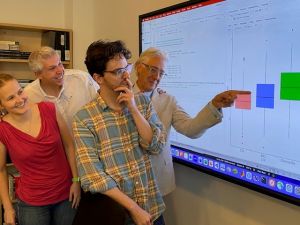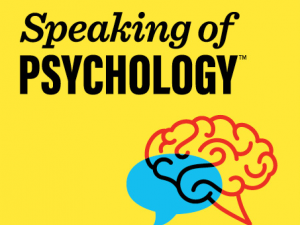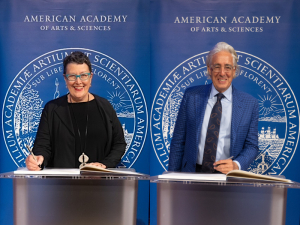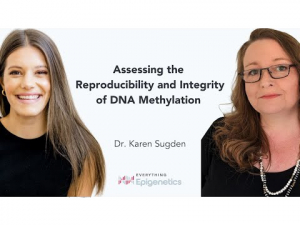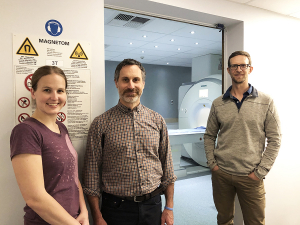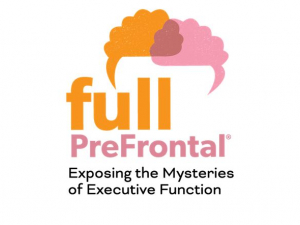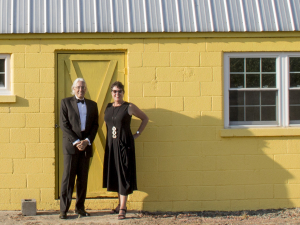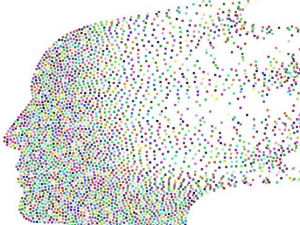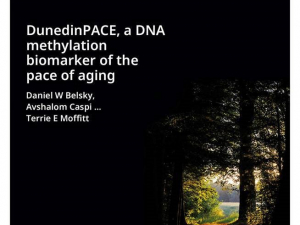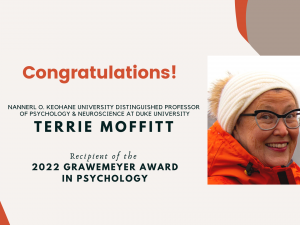On the occasion of the Hebrew University's 100th anniversary, Temi was awarded an honorary doctorate. Here is Temi with her very proud mother-in-law, holding the newspaper announcement in Israel: Here is a Ynet story in HebrewAlas, the festivities were curtailed by the war: We… read more about Temi Awarded Honorary Doctorate by the Hebrew University in Jerusalem »
DunedinPACNI estimates the longitudinal Pace of Aging from a single brain image to track health and disease. See the paper here: DunedinPACNI Nature Aging Review: hereDuke Today video: here read more about Introducing Dunedin PACNI: A tool to estimate the longitudinal Pace of Aging from a single brain scan. »
Terrie E. Moffitt joins the Global Healthspan Extension Consortium. read more about Temi joins the Global Healthspan Extension Consortium »
Daniel W. Belsky, PhD, will receive the 2025 Vincent Cristofalo Rising Star Award in Aging Research. Dr. Belsky is an Associate Professor of Epidemiology in the Mailman School of Public Health (Department of Epidemiology and Robert N. Butler Columbia Aging Center) at Columbia University Irving Medical Center (CUIMC). Learn more about his research here read more about Daniel W. Belsky, PhD, receives the 2025 Vincent Cristofalo Rising Star Award in Aging Research »
In this new episode of the American Psychological Association’ podcast “Speaking of Psychology”, Terrie Moffitt speaks about why some of us age faster than others. Listen here. read more about Why do some of us age faster than others? A conversation with Terrie Moffitt at the American Psychological Association »
Childhood exposure to leaded gasoline may be responsible for more than 150 million mental health disorders in Americans alive today. That’s the shocking takeaway from a recent study published in the Journal of Child Psychology and Psychiatry. It suggests that anyone born before 1996—when leaded gasoline for passenger vehicles was finally banned—was almost certainly exposed to harmful levels of this heavy metal as a child. As a result, huge chunks of the population are walking around with at least some level of… read more about Leaded gasoline didn't just pollute the air, it may have led to 150 million mental health disorders »
Postdoctoral Fellow OpeningIn a longstanding collaboration between the Moffitt-Caspi Team and the Hariri Lab https://www.haririlab.com/home.html, we are recruiting new postdoctoral fellows for fall 2025. We seek trainees who have a specific interest in midlife aging, its origins in early life, and its implications for mental and physical health in later life. The training positions are based at Duke University and are funded by the National Institute on Aging. The research training will be… read more about Currently Recruiting for Postdoc Opportunities »
Who knew epigenetics could be so much fun? The Kardashians just tested their DunedinPACE! Read more here. read more about The Kardashians tested their DunedinPACE! »
The study, which appears March 14 in Alzheimer's & Dementia: The Journal of the Alzheimer's Association, suggests that targeting disadvantaged neighborhoods for dementia prevention programs and encouraging clinicians to consider a patient’s address could help lower dementia risk. Read more here. read more about Poor Neighborhoods Linked to Elevated Dementia Risk and Faster Brain Aging »
Terrie Moffitt, Nannerl O. Keohane University Distinguished Professor of Psychology & Neuroscience has received the title Member of the Most Excellent Order of the British Empire, commonly known as the MBE. The honor, also bestowed upon many celebrities over the years, was presented to Moffitt by King Charles III at a ceremony in Windsor Castle in recognition of her outstanding scientific achievement and service to the United Kingdom. Established in 1917 by King George V, the MBE is the third highest… read more about Terrie Moffitt Receives Royal Honor From the British Monarchy »
Renate Houts along with Annchen Knodt, Kathy Xie and our research team won 1st prize in the Research Data Visualization Competition at Duke University. The competition theme was “Through Time,” fitting as Duke celebrates its 100th anniversary and also exactly what our longitudinal research does! Read more here. read more about First Prize in Data Visualization Competition: Renate Houts, Annchen Knodt, and Kathy Xie »
You can read more about our key findings on representation of women in science here. The full world ranking is available here. read more about Terrie E. Moffitt is ranked 4 among Top Female Scientists for 2023 »
In this edition of the Everything Epigenetic podcast, Karen Sugden explains the importance of measurement reliability in measuring aging. Listen here. read more about Assessing the reproducibility and integrity of DNA methylation data, with Dr. Karen Sugden »
An essay by Lisa Melton discusses tools for measuring biological aging, including DunedinPACE, and how these could be used in evaluating rejuvenation interventions. See here for the full story. read more about Nature Biotechnology article about measuring aging features DunedinPACE »
Measuring your Biological Age has been extremely popularized because of how highly correlated it is to almost every chronic disease and death. However, the Biological Age of a person is limited in the sense that it is a “historical-based” age, meaning it only captures how quickly you’ve been aging since your inception up until the present moment. Listen here. read more about How Fast are you Aging, Really? with Dr. Terrie Moffitt »
Temi was recognised in the King's Birthday Honours list (2023) and appointed Member of the Most Excellent Order of the British Empire (MBE). read more about Temi appointed Member of the Order of the British Empire (MBE) »
Annchen Knodt, David Ireland, and Tracy Melzer launch the NIA-funded Phase 52 Brain Imaging Study in the Dunedin Longitudinal Study. A big thank you to the team at Pacific Radiology!!! read more about Dunedin Brain Imaging Study »
Biologically, we all age. Joints get stiffer, arteries get thinner and eyes and ears just don’t gather information they way they used to. Based on their unparalleled collection of five decades of health data following residents in Dunedin, New Zealand, Duke psychologists Terrie Moffitt and Avshalom Caspi have devised a way to measure whether a person is biologically aging one year for every calendar year or at a faster — or slower — pace. Listen here. read more about How fast are you aging? »
This episode of Top of Mind with Julie Rose tackles new ideas about mental illness. It discusses the use of psychedelics, indigenous practices, and also our team’s research findings, in an interview with Terrie Moffitt, among several other guests. Listen here. read more about Thinking differently about mental illness »
Founded in 1780, the Academy honors excellence and convenes leaders to examine new ideas, address issues of importance to the nation and the world, and advance the public good. This year’s election of 261 new members continues a tradition of recognizing accomplishments and leadership in academia, the arts, industry, public policy, and research. Read more here. read more about Terrie Moffitt and Avshalom Caspi elected to American Academy of Arts & Sciences »
A lifelong study of 1,000 New Zealanders finds that people who express vaccine hesitancy today had more difficult childhood experiences. The Duke researchers who lead the study said the findings suggest that combating vaccine hesitancy will take more than catchy advertising. Read more here. read more about Does vaccine hesitancy begin with mistrust in childhood? »
The internationally-renowned Dunedin Study celebrates its 50th anniversary this week, marking five decades of research impact around the world. The first Dunedin baby to enter the University of Otago’s Dunedin Multidisciplinary Health & Development Study was born on 1 April 1972 and over the course of the following year a further 1037 babies became Study members. Read more here and here. Happy 50th Birthday toast! read more about Dunedin Study celebrates 50 years »
In 1923, lead was first added to gasoline to help keep car engines healthy. However, automotive health came at the great expense of our own well-being. A new study calculates that exposure to car exhaust from leaded gas during childhood stole a collective 824 million IQ points from more than 170 million Americans alive today, about half the population of the United States. Read more here. read more about Lead Exposure in Last Century Shrank IQ Scores of Half of Americans »
Preventing mental disorders in young people might reduce or delay the burden of dementia in older people, according to a new study. Read more here. read more about Mental disorders may increase risk for subsequent dementia »
Measures to quantify changes in the pace of biological aging in response to intervention are needed to evaluate geroprotective interventions for human. Read more here. read more about DunedinPACE, a DNA methylation biomarker of the pace of aging »
This review outlines current debates about the sharing of research data, with a focus on relevance for Aotearoa/New Zealand. Read more here. read more about Understanding the data-sharing debate in the context of Aotearoa/New Zealand: a narrative review on the perspectives of funders, publishers/journals, researchers, participants and Māori collectives »
Professors Chuck Nelson and Dan Schwartz received the 2021 Klaus J. Jacobs Research Prizes for pushing scientific boundaries within their disciplines to identify opportunities for improving children’s education and lives. Terrie Moffitt chairs the prize jury. Read more here. read more about Recognizing Outstanding Research: 2021 Klaus J. Jacobs Research Prizes »
Terrie Moffitt is the 2022 recipient of the Grawemeyer Award in Psychology. Read more here. read more about Terrie Moffitt named 2022 Recipient of the Grawemeyer Award in Psychology »


